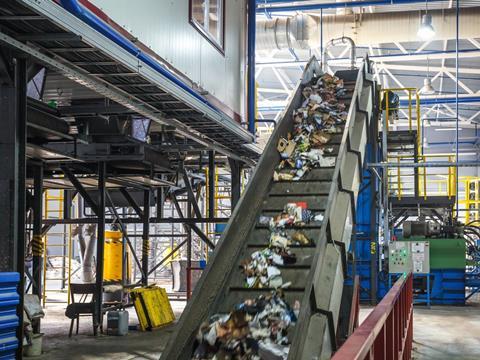
In a strategic partnership with its sights set on intelligent and automated recycling plants, Bollegraaf will transfer its AI vision business to Greyparrot, take a non-controlling stake in the company, and become a worldwide distributor for its AI waste analytics platform.
The agreement involves Bollegraaf making a total cash investment of €12.8 million for its non-controlling stake in Greyparrot. Furthermore, Greyparrot will acquire Bollegraaf’s vision-based computing intellectual property and AI development team and open its first office in mainland Europe in the Netherlands.
Approximately 5,500 global facilities are currently said to handle municipal solid waste, yet the companies warn that 3.4 billion tonnes of waste are expected to be generated every year by 2050. As such, they seek to use AI and other new technologies to boost processing times and improve recycling rates.
Only 1% of waste is currently thought to be monitored in facilities, while 40% of waste sorting is carried out by hand in advanced economies – yet AI is expected to digitize and automate systems by collecting data in real time and capturing lost financial value.
As such, Bollegraaf and Greyparrot intend to retrofit ‘thousand’ of existing Materials Recovery Facilities (MRFs) and Plastics Recovery Facilities (PRFs) with advanced AI capabilities; by integrating smart features and automation into recycling plants, it is hoped that new value can be found in waste streams while millions of tonnes of waste are diverted away from landfill, incinerators, and the natural environment.
As such, the move is anticipated to boost recycling rates ‘significantly’ and quantify material emissions – as well as help Greyparrot and Bollegraaf continue to develop products that utilize their combined strengths to fully automate sorting facilities by integrating intelligent machinery into their operations.
Greyparrot’s Analyzer platform uses AI camera systems to provide visibility into waste streams at recycling plants and is currently utilized in 14 countries. Apparently, it analyzed over 25 billion waste objects in 2023 – separating them into over 70 categories in real-time based on material type, financial value, greenhouse gas emissions, brand, and other layers of data.
Increasing data transparency is also hoped to help waste managers prove that they are complying with regulatory and contractual mandates, theoretically driving collaboration between producers, waste managers, and regulators in the recovery and reuse of waste materials.
“With 63 years of industry experience, Bollegraaf continues to be a global leader in fully-automated innovative turnkey recycling systems,” said Edmund Tenfelde, CEO of Bollegraaf Recycling Solutions. “The future is clear: to further increase recycling rates we need more insight and collaboration across the value chain.
“We have been looking to implement AI that can power fact-based and automated decision-making to provide our clients with a much more accurate overview of their waste composition and ultimately maximise their ROI. We are thrilled to make this strategic investment and partner with Greyparrot to bring waste intelligence to both upcoming recycling infrastructure deployments and existing facilities worldwide.
“We believe that Bollegraaf’s comprehensive knowledge of automation of recycling MRF operations, premium equipment quality, and unique engineering expertise empowered with Greyparrot AI systems represent the one-of-a-kind synergy that is destined for success.”
Mikela Druckman, CEO of Greyparrot, adds: “In a world drowning in waste, a large percentage of which is recoverable, the urgency for action has never been greater. It’s time for a revolutionary leap in how we value, capture, and manage our waste.
“We’re excited to partner with Bollegraaf, and add to our team of experts in artificial intelligence and deep learning, to address this challenge and pave the way for the waste industry’s largest rollout of AI to date. Getting AI waste analytics in the hands of more plant managers, more quickly, will provide the industry the data-driven insights needed to build and operate smart MRFs that unlock new value from recovered materials and decrease the environmental impact of waste.
“Collaboration with plant builders and other key players is critical to making this happen, and it’s a major reason why Greyparrot is hardware agnostic, making it possible to integrate our platform with all types of systems. Progress in addressing the waste crisis can only happen if we work together and commit to systemic change driven by waste intelligence.”
Previously, Greyparrot’s AI-powered waste recognition system was announced as a winner of Amcor’s Lift-Off programme, for which it received a $500,000 investment and access to Amcor’s sustainability and packaging capabilities to scale up its technology.
In other news, Recycleye, Valorplast, and TotalEnergies led a research project that used AI and machine learning to identify and separate food-grade polypropylene from household post-consumer waste, reportedly leading to ‘ground-breaking results’.
Recycleye and FANUC UK also combined their respective proprietary AI vision technology and LR Mate robots to create an automated detection and sorting process for dry mixed recyclables, apparently achieving a 12% sorting accuracy and a 10% improvement in line output.
If you liked this article, you might also enjoy:
The Lidl approach to packaging sustainability
How did Brazil achieve its 100% aluminium can recycling rate – and can it be replicated in the EU?
Experts have their say on the EU’s Packaging and Packaging Waste Directive revisions
A deep dive into the most important packaging sustainability trends and solutions














No comments yet